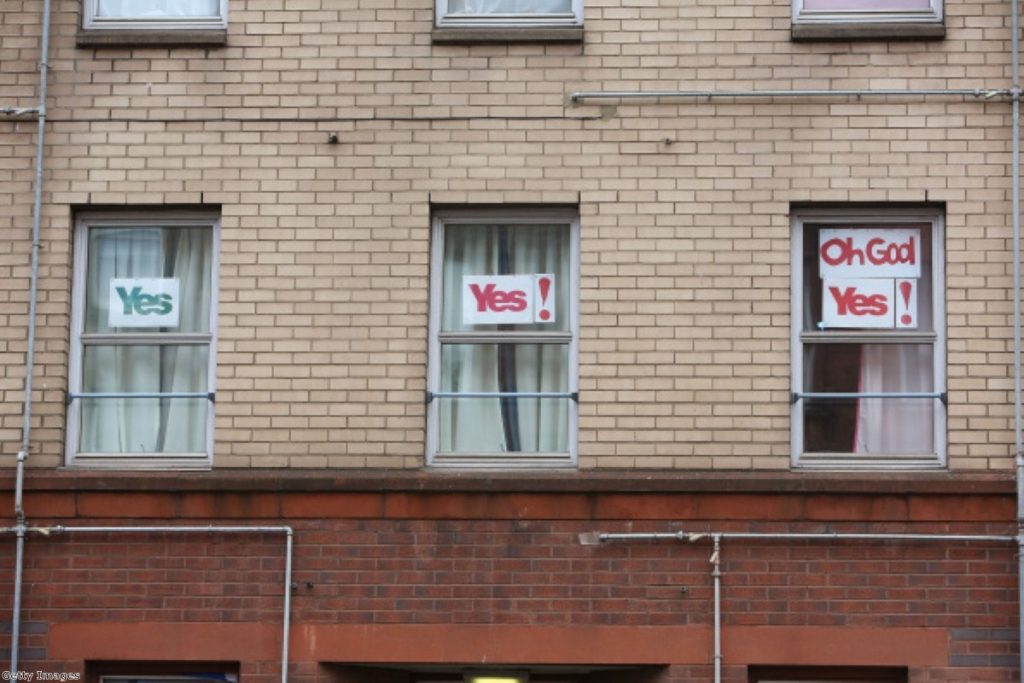Is Westminster lying about giving Scots more power?
"More Powers for Scotland Guaranteed."
One of the central promises of the 'No' campaign is that if Scots choose to reject independence, they will be rewarded with further devolution.
This seems a slightly odd promise to make. 'Vote against independence in order to get a bit more of it' isn't an obviously winning slogan and it's a claim that many Scots are deeply suspicious of.
Much of that suspicion is rooted in events more than three decades ago. Back in 1979, Scots were promised greater independence in return for a 'No' vote on the referendum for a Scottish assembly.


Despite this promise, a majority voted in favour of devolution anyway.
There was a nasty catch however. The UK government had built in a requirement that more than 40% of the total Scottish electorate needed to vote in favour in the referendum, in order for it to go ahead. A relatively low turnout meant that the will of the Scottish people was ignored.
Worse than that, the promised 'better form of devolution' never materialised either. The Scottish people were betrayed.
Fast forward to 2014 and those old wounds are still keenly felt.
"More than three decades ago the people of Scotland were promised a 'better form of devolution' in return for a No vote in 1979," a spokesperson for the SNP warns.
"Instead they were given 18 years of Tory rule."
This claim is particularly galling for those who remember the SNP's own role in bringing about that Tory government, but it is effective nonetheless.
"Scotland was conned in 1979 but we will not be conned again," SNP MSP Bruce Crawford declared last year. But is anyone really trying to con the Scots?
Scottish historian and leading independence commentator David Torrance doesn't believe so.
"When you have a personal pledge from the prime minister and the other major party leaders and when this is backed up by acts of parliament and detailed manifesto pledges, then it's about as watertight as any political pledge can get," he tells me.
Those pledges are particularly detailed. All three major parties have released specific manifestos detailing the new powers they plan to hand Scotland in the event of a 'No' vote.
Interestingly the party offering the biggest form of devolution are the Conservatives, who have proposed handing full income tax raising powers to the Scots.
The Liberal Democrats are also committed to what they call "Scottish home rule" whereby the Act of Union between Scotland and England is replaced by a new "declaration of federalism".
Torrance suspects that if there is any resistance to large-scale devolution, it could come from Ed Miliband's party.
"There are elements in the Labour party, particularly among Scottish MPs, who are resistant to watering down their powers in parliament," he says.
There is also a question of timing. All three parties may be agreed to further devolution in principle but, will it be an immediate priority for any of them?
"I think it comes down to the margin of the vote," Torrance believes.
"If it's 65% against independence, then there would be a move among the dinosaur wing of the Labour to water [devolution] down. However, that kind of margin looks extremely unlikely."
A much closer result could also cause problems, leading inevitably to demands for another referendum.
"I don't think that there would be an immediate push for a second referendum, but I can see the debate re-emerging if there was an EU referendum in 2017.
"You could easily see a situation where the UK votes to leave the EU, but Scottish people vote to stay. The SNP would then have a very strong argument for a further Scottish independence referendum."
Conversely, problems may also arise if Scotland does vote for independence.
Torrance lends credence to those calls from some leading government figures for the UK general election to be postponed if Scotland votes 'Yes'.
"If Scotland votes 'Yes' then there would need to be immediate negotiations between the Scottish and UK governments.
"It would be a massive undertaking. The idea that the general election could take place halfway through such complex negotiations is hard to believe. How does that possibly work? Delaying the general election would seem very likely to me."
Trying to predict the ramifications of a 'Yes' or 'No' result this month could well prove a fool's errand. If Scotland votes to leave the UK, then it would have major and majorly unpredictable effects not just on Britain but across the world. Similarly, a 'No' vote could end up leading to Scots eventually being handed independence in all but name.
Either way, history seems to be running in one direction. Whatever the result of the referendum, the will of the Scottish people is clearly for greater independence from Westminster. None of the major political parties can afford to ignore that will any longer.









